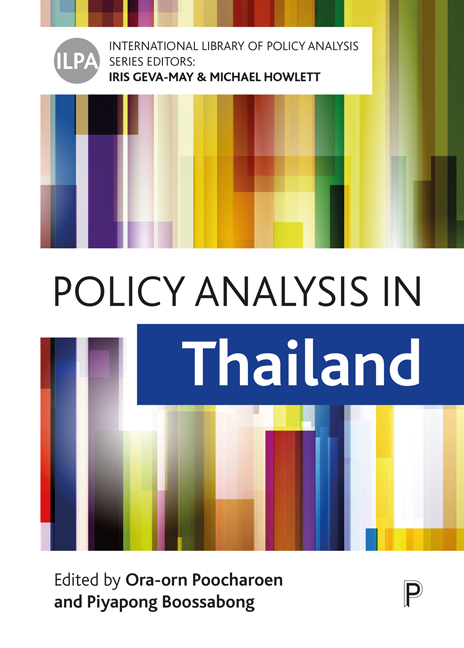Book contents
- Frontmatter
- Contents
- List of figures and tables
- List of abbreviations
- Notes on contributors
- Editors’ introduction to the series
- Introduction
- Part One History, styles and methods of policy analysis in Thailand
- Part Two Policy analysis within executive government
- Part Three Policy analysis beyond executive government
- Part Four Political parties and interest groups in policy analysis
- Part Five Policy analysis education and research
- Index
twelve - Business associations and policy analysis
Published online by Cambridge University Press: 20 January 2024
- Frontmatter
- Contents
- List of figures and tables
- List of abbreviations
- Notes on contributors
- Editors’ introduction to the series
- Introduction
- Part One History, styles and methods of policy analysis in Thailand
- Part Two Policy analysis within executive government
- Part Three Policy analysis beyond executive government
- Part Four Political parties and interest groups in policy analysis
- Part Five Policy analysis education and research
- Index
Summary
Introduction
Business associations are known as one of the interest groups in the public policy landscape. For instance, big corporations employ various techniques to engage with or even influence the government in ensuring that state regulations would not harm their business operation (Moore and Hamalai, 1993; Lim et al, 2021). To name a few, corporations would do lobbying, establish government-relations departments to contact public officials, make comments on proposed regulations or laws, take consultation positions in government advisory committees, and so on (Godwin et al, 2018).
In Thailand, local entrepreneurs who were the forerunner of the bourgeois class were mainly ethnic Chinese. Laothamatas (2019) stated that in the 1940s to 1950s, these Chinese businesspersons secretly influenced public policy by giving bribes or having clientelist relations with bureaucratic leaders. This aligns with the prevalent peasant struggle and relentless push for a nationalistic government policy of that time. However, the status of the middle and business class elevated from a society-centered model of Western industrialisation and democratisation, which became a new paradigm for the country. One could predict that the business class would assert national leadership or, at the very least, will seek to engage with the public policy formation to ensure that state regulations will be in their favour. What differs from previous decades is that the business class collectively asserts demands to the government in the form of business or trade associations which have gained political and economic power and finally replaced student groups as the strongest among civil society groups in Thailand (Laothamatas, 2019).
The establishment of the Joint Public and Private Sector Consultative Committee (JPPSCC) in 1981 was the keystone for the success of the business class’s official and systematic influence on public policy. The JPPSCC was first established at the national level (Bangkok metropolis) and later at provincial levels spreading in 76 provinces. At the national level, the prime minister is the chairperson of the JPPSCC that convened the public and private sectors involving the three most important business associations, namely: the Thai Chamber of Commerce (TCC), the Federation of Thai Industries (FTI) and the Thai Bankers’ Association
- Type
- Chapter
- Information
- Policy Analysis in Thailand , pp. 219 - 229Publisher: Bristol University PressPrint publication year: 2023



